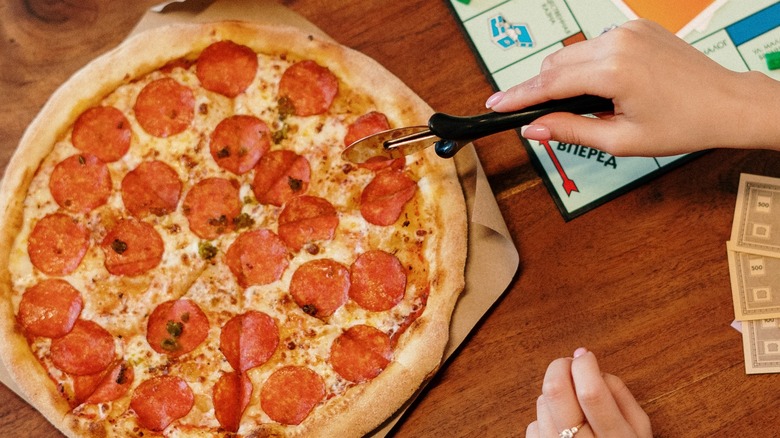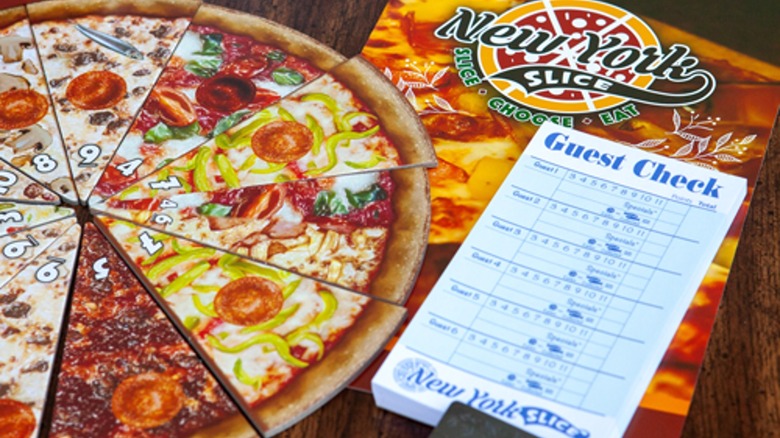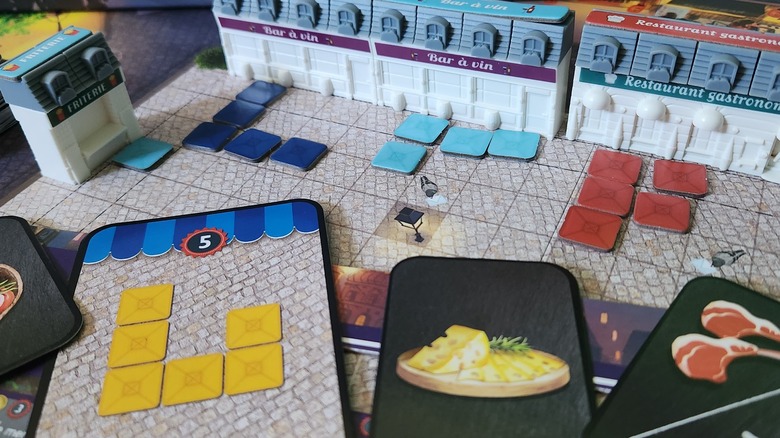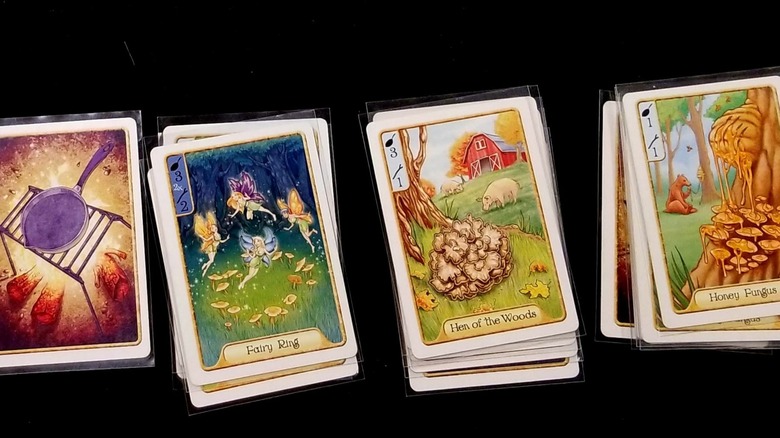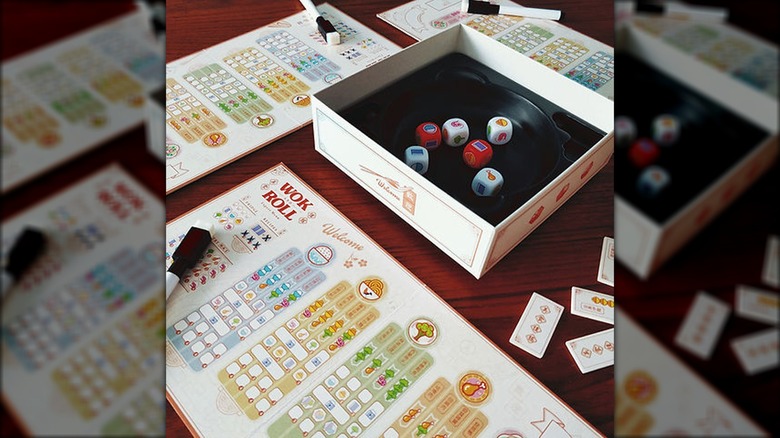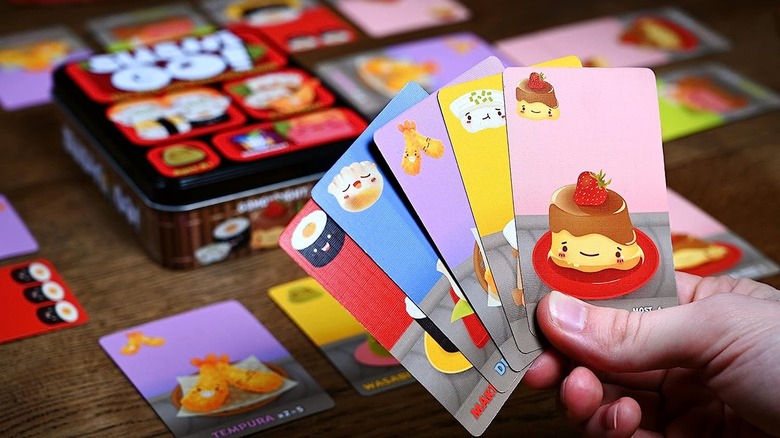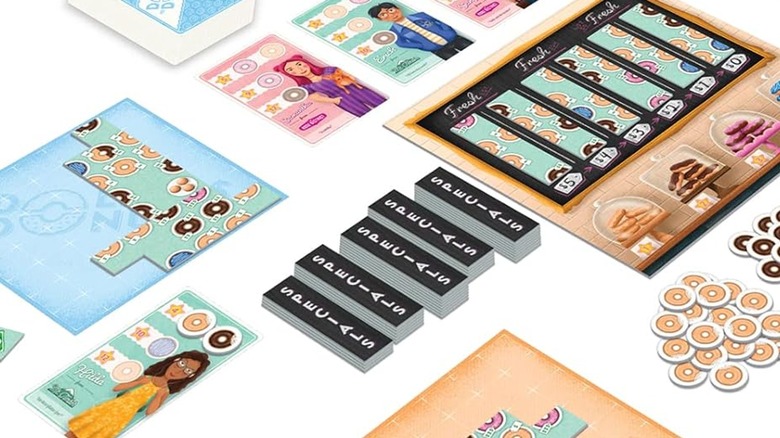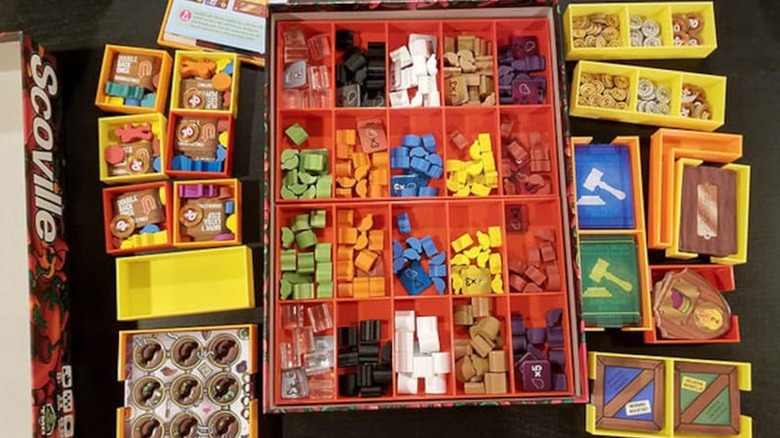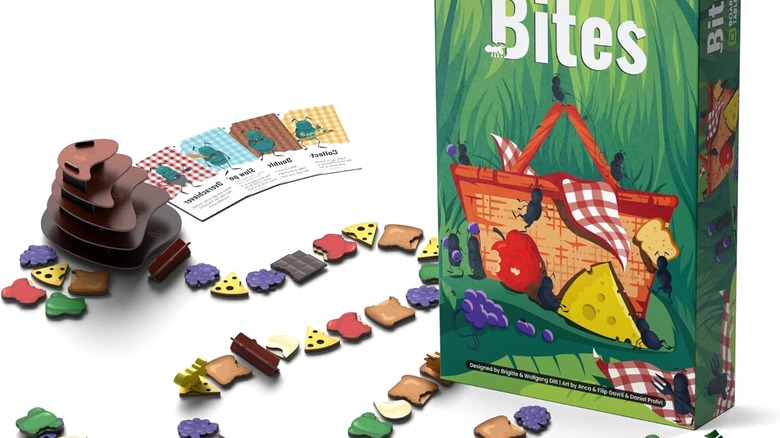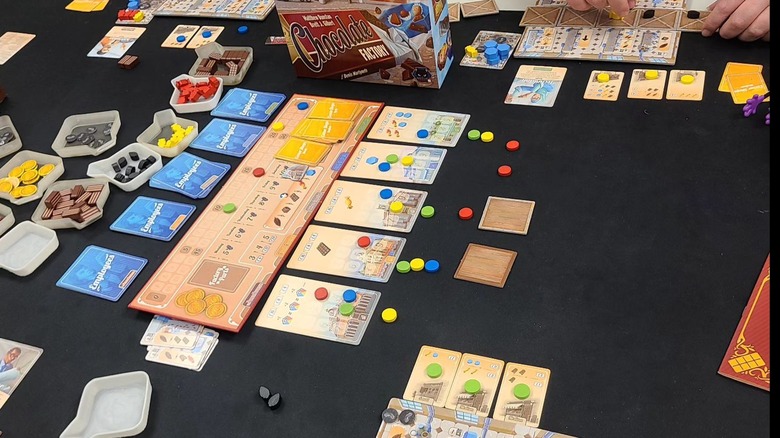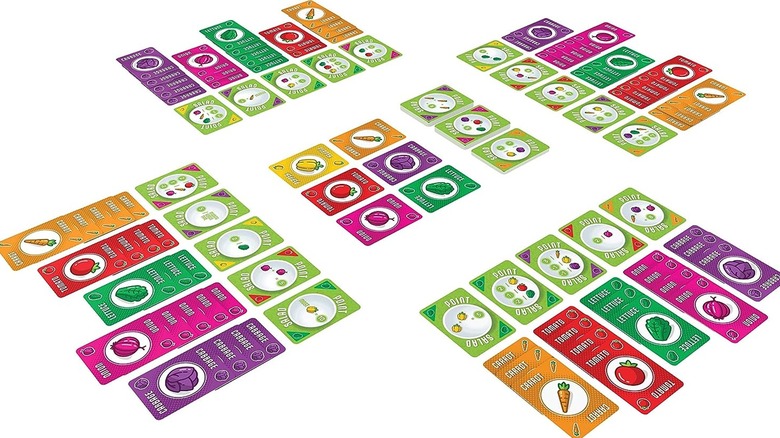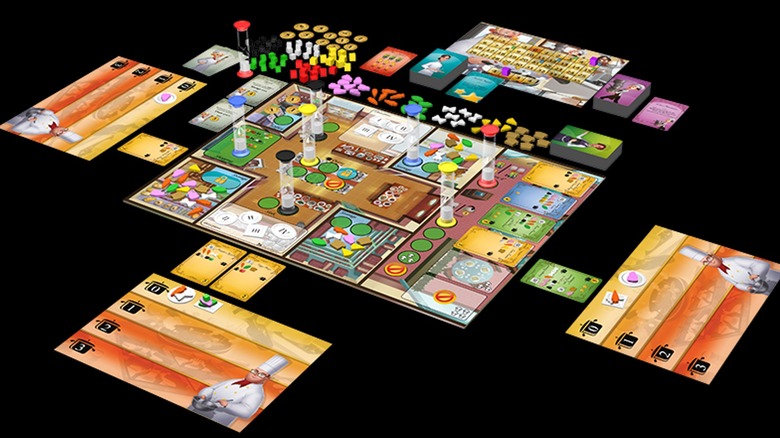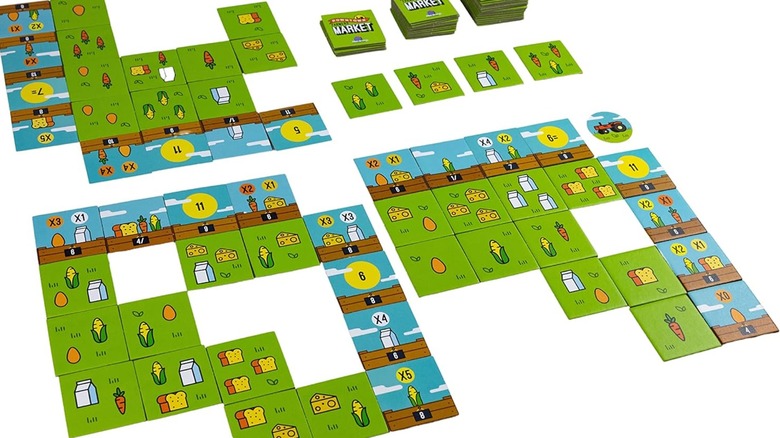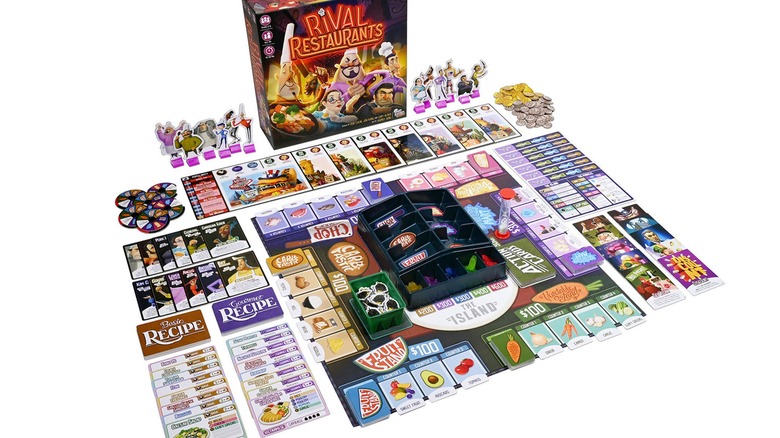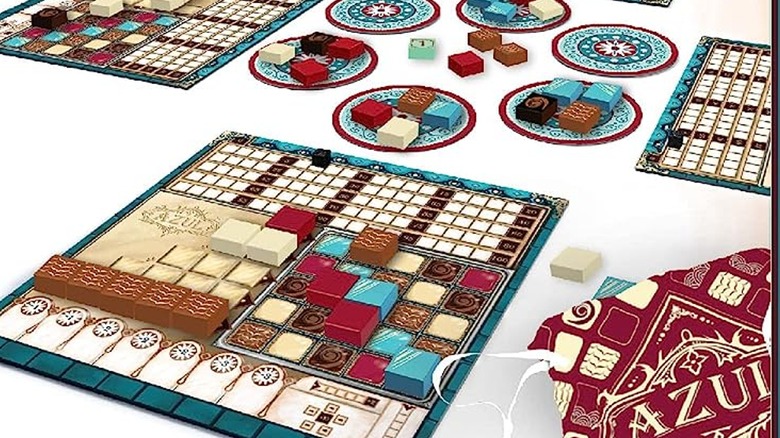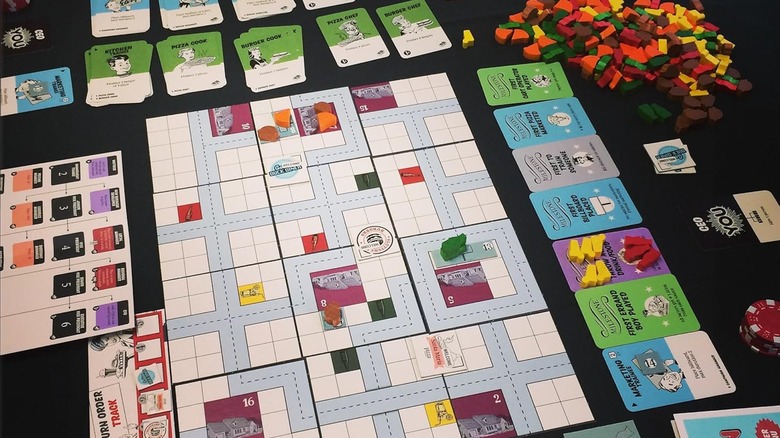Food-Themed Board Games Every Foodie Should Play
We may receive a commission on purchases made from links.
Have you been looking for a way to combine your love of food with your passion for gaming? Why not put a few foodie board games on your wishlist? It can sometimes be challenging to know which ones to try and which ones aren't going to be as fun as they look. However, we've compiled a list of enjoyable titles to help you get started.
Our list includes both games we've played and enjoyed and those recommended to us by members of a regional tabletop gaming group. All of them have a BoardGameGeek rating of 6.71 and above on a scale of one to 10. These ratings come from a significant number of raters, so they're tried and true. We've included games that are so simple you could teach non-gaming family members to play during the next holiday, as well as more challenging games. You'll find card games, cooperative games, foodie versions of classics, and games with solo modes. We've even included one odd-duck game that dedicated gamers will find themselves immersed in for hours at a time.
Get ready to explore the top food-themed board games every foodie gamer should have in their collection. Plan to play one or a few of these, and you'll have an unforgettable game night. Just be prepared to have to satisfy a few real food cravings along the way.
15. New York Slice
When you step inside the game of "New York Slice," it's easy to imagine that you're inside a real mom-and-pop pizza parlor. After all, the game comes inside a pizza box and the playing pieces are slices that form whole pizzas when you put them together. To make you feel even more like you're at a pizza restaurant, the instructions come on a menu and the scoring pad looks like a guest check.
If you're the type of player who enjoys strategy puzzles, this one is for you. It doesn't take long to learn the rules, but the choices for which New York pizza pieces you need to score the most points can be challenging since your strategy could backfire.
It makes for a great party game or family game because it's so easy to learn, only takes half an hour to play, and is appropriate for ages 8 and up ... without feeling like it's for kids. The good news is that, if you find yourself addicted to playing, there are seven expansions available.
14. Dinner in Paris
For foodies dreaming of eating in Paris without needing a plane ticket, "Dinner in Paris" provides a simulated mini gourmet adventure. However, instead of eating in Paris, you pretend to be a restaurant owner trying to convince customers to come to your dining establishments. You want to build as many eateries as possible, but building more restaurants requires the collection of specific ingredients. Your options for a new style of restaurant include pizzeria, brasserie, and friterie. Then, you have to get customers to your restaurant by creating terrace paths.
In this resource-building and tile-placement game, it's important to place your restaurants and terraces in such a way that no terraces touch. As such, the terrace-building portion can get competitive, especially with more players. Reaching certain shape and quantity goals with your terraces, having more restaurants, and generating more income helps you win.
There are already plenty of plates spinning as you play to make it interesting. However, there's also an expansion that features food trucks if you want to take it to the next level.
13. Morels
If you're the type of foodie who likes to go foraging for mushrooms, you're going to need to own a copy of "Morels." It's a gorgeous set-collection card game with artwork that will transport you to a lush forest full of mushrooms.
"Morels" is a two-player game and only takes a half hour to play. You'll be leisurely competing to find, cook, and sell mushrooms. The cards include representations of lots of yummy edible mushrooms, like oyster mushrooms and hen of the woods. However, you'll want to beware of the destroying angel mushroom. Once you have three of any one type of edible mushroom, you can cook them up in your frying pan. Adding butter or apple cider gives you even more points. Night mushrooms are worth more than day mushrooms, and you might even find fairies flying around fairy rings.
This relaxing, uncomplicated game will have you itching to go on a foraging hike and bring home real mushrooms for your frying pan. The "Foray" expansion adds new cards and rules.
12. Wok and Roll
Foodies who love wok cooking and enjoy the dynamics of Yahtzee will likely enjoy "Wok and Roll." This game lets you put on your chef's hat and start filling orders at a Chinese restaurant in Singapore. The goal is to gather enough ingredients to make complete recipes and make more than the other players.
It plays a lot like Yahtzee where you try to get the right combination of ingredients from dice rolls. You can reroll some of the dice each turn and try to get necessary ingredients. There are also a few extra methods for collecting ingredients, like grabbing them out of the fridge or pulling them out of the overflow of veggies you get from other rolls and collecting cookbooks.
You can start with the simple version, and then flip the playing board to the other side for the expert level when you want a challenge. There are also Korean and Wok Hei expansion packs.
11. Sushi Go!
Have you ever been out for sushi and had someone snatch the roll you wanted before you got the chance? This card game is a little like that experience. The artwork for the cards is very kawaii (endearingly cute) and features anthropomorphized versions of items you may find on a sushi restaurant menu, like tempura, sashimi, nigiri, salmon, squid, wasabi, maki rolls, dumplings, and pudding.
It's a light card drafting game with rules that are simple and rounds that go fast. You score points based on collecting the right number of certain types of cards. So, you're always trying to strategize about which cards to keep and which to pass.
"Sushi Go!" is considered a gateway game for those who haven't played a lot of modern tabletop games. So, you can introduce it to kids, friends, and family who may be apprehensive. There are several expansions and even a party version if you find yourself addicted to it, as some do.
10. Dollars to Donuts
Playing "Dollars to Donuts" takes you to a whimsical donut shop where customers from several neighborhoods want you to fill their orders. It's a unique little game that you'll be better at strategizing for every time you play, especially if you've been practicing with the handy solo version.
Customers will be asking for different quantities of plain, chocolate, sprinkle, and jelly donuts. To fill customer orders, you create donuts on a gridded puzzle board in front of you. Each donut tile puzzle piece you buy has different combinations of half donuts you need to match with other donut tiles to make whole donuts. You earn money for each whole donut you create and score victory points for fulfilling customer orders. You'll also score points for matching pairs of donut hole tiles and serving customers from different neighborhoods. Of course, there are ways to lose points, too, like empty tiles on your board or leftover donuts you didn't sell.
Playing will likely make you hungry for donuts, so be sure a donut run is possible before you get started.
9. Scoville
Fans of hot sauce and hot peppers have likely heard of the Scoville scale that ranks pepper heat levels from "meh" to "take me to the hospital." In "Scoville" the game, you plant hot peppers and use them to make hot chili, so it has a double appeal for foodies who also like gardening.
It may take a couple of plays to start developing the cutthroat strategies you need to block your opponents from winning. The planting portion reminds us of "Animal Crossing" in that you have to strategize which peppers to plant next to each other to get the color of peppers you want as you move across the board. There are several ways you can get points, including growing certain peppers before the other players, selling peppers at the farmers market, and making hotter chili recipes with hotter peppers.
There's a necessary time investment with this one, as each playthrough takes 60 to 90 minutes. However, it will go quickly if strategizing motivates you.
8. Bites
Playing "Bites" may be the only time you want to invite ants to your picnic. At first glance, you might think this 3D game looks like it's for kids, but it's rated for ages 12+ and includes wine, so for adults, too.
It's a fast, simple game you can trot out even for players who aren't typically gamers. However, the beauty of "Bites" is that it's different every time you play. The four-ant hill, chocolate, wine, and special cards you choose at the beginning dictate the rules. Ants move along a path of food leading to their ant hill, only landing on food that corresponds to their color. You'll collect points for the food you sample along the way.
The simplicity of the rules and the fact that the strategies change every time you play make for a high replay-factor. If you find yourself gaming with someone else who owns "Bites," you can get really crazy and combine the boxes to make a "Double Bites" game.
7. Chocolate Factory
If Willy Wonka or Lucille Ball ever made you wonder what it would be like to work in a chocolate factory, "Chocolate Factory" is your chance. It's moderately complex and takes at least an hour to play, but if you're up for the challenge, you'll have fun.
In "Chocolate Factory," you turn cocoa beans into chocolate and chocolate into candy to box up and sell to small corner stores and department stores around town. The time you spend using different factory parts to make better chocolate is a solo endeavor, so you'll feel more involved than you might in games where you have to sit around waiting for your turn.
There's a bit of luck involved in which cards you draw, but the engine-building portion is immersive fun. If you're intrigued, you might want to start with the deluxe edition, which includes higher-quality parts as well as the mini-expansion.
6. Point Salad
Veggies are at the heart of this game, but you won't be making a salad with them. Instead, you'll be making a point salad. If you're not familiar with the term "point salad" in tabletop gaming, it's when there are a multitude of ways to earn points during play. For example, you can get points for having the right combination of vegetables or the largest amount of a certain vegetable. You might also lose points for having certain vegetables.
This is an open drafting game where you'll place one point card or two vegetable cards in front of you during each turn. The point cards dictate which veggies you want next. It can get competitive as players snatch up veggies they know could earn others lots of points. The suspense is over when you finally find out how many points you can get from your point salad at the end.
Simple play dynamics give "Point Salad" the potential to become a classic card game. It's a different experience every playthrough since the ways you can score change every time you play.
5. Kitchen Rush
If "The Bear" got you curious about what it might be like to experience the chaos of cooking in a fast-paced kitchen – minus the anger, of course — this game is for you. "Kitchen Rush" is a fun, cooperative speed game that puts you and your friends together in a restaurant kitchen trying to get out orders.
The board has the layout for a real kitchen with places to store food and spices, places for cooking, places for washing dishes, and an office. There's also a maitre d' area to pick up new orders to fill. Every round is four minutes long, and you have to work together, communicating to get everything you need to properly cook as many orders as you can during the round.
The name "Kitchen Rush" is apt since it feels like you're rushing around a real kitchen. Trying another round or two to try to win the game never necessarily gets easier, but it's still fun. If you end up loving "Kitchen Rush" life, there are several expansions to kick things up a notch.
4. Downtown Farmers Market
While "Downtown Farmers Market" contains foods like bread, cheese, milk, eggs, corn, and carrots, there is no other farmers-market-related component to the game. That's fine, because it's still a fun little food-themed game to play.
You start by placing a row of four challenge tiles and a column of four challenge tiles to create a 16-tile grid. The setup ends up looking like columns and rows on a spreadsheet. Throughout the game, you're trying to place food tiles inside the grid to match the challenges on both the horizontal and vertical challenge tiles at the same time. For example, you might want no carrots in one row and exactly six eggs in one of the columns. You only get scores for rows and columns when you've succeeded with the challenge. Gameplay doesn't require a lot of talking since you're mainly trying to think of a good strategy. However, there is some interaction with others, as you grab tiles others might like and hope for the best tiles to meet your challenges.
"Downtown Farmers Market" is simple to learn and play. With only 16 turns to take, it goes quickly, but you might need a little time to strategize.
3. Rival Restaurants
"Rival Restaurants" is one of those games you want to play with a lively group of people. Each player is the chef at a rival restaurant in the same small town trying to get 20 social media likes from happy customers before the competition.
Every round you'll have only a short amount of time to get the ingredients you need for your recipes. While you can buy them, the fun comes in negotiating for them with other players. Sure, you'll trade an avocado for some beef, but you might make your opponent take some of your trash, too. There are ways to upgrade your restaurant, including celebrity endorsements. However, there are also opportunities to screw over your opponents with action cards that let you do things like steal half of another player's money.
The art for "Rival Restaurants" is just as fun as the gameplay. It has a medium complexity level since there are a lot of things going on. However, we think you're bound to enjoy yourself for the hour it takes to play.
2. Azul: Master Chocolatier
"Azul" has become an instant classic over the last few years. But if you're a chocolate lover who doesn't already own "Azul," you may consider getting "Azul: Master Chocolatier" instead of the original. Instead of Moorish-style palace tiles, the "Master Chocolatier" version features a variety of delectable 3D cubes of chocolate that are likely to make you hungry for real chocolate. So, the setting is a chocolate factory rather than a tile factory for this version.
Play is similar to the original "Azul," except that it has a small variant regarding the way the factories work when you grab tiles. Otherwise, you'll still be gathering points based on how you place your chocolate pieces on the board and work toward completing patterns.
"Azul: Master Chocolatier" is one of those games that is far more fun to play than it sounds from the description. Once you've played it, you're going to want to play it again and again to work on your strategy.
1. Food Chain Magnate
Foodies who like their food with a side of organized crime are likely to be drawn to this board game. "Food Chain Magnate" has the distinction of being the 38th most popular game on BoardGameGeek. While it has an amazing rating of 8.1 out of 10 stars, it's going to take two to five hours (or even longer) to play it, which may not be for everyone. However, if you're a foodie gamer who enjoys building the perfect system and having lots of fun, it just might be what you're looking for.
There is a parallel with "Monopoly" in that you want to become the CEO who makes all the money. You try to build up your employee base and advertising while making everyone in town want your food. It can be a relentlessly competitive game, with price wars and fickle customers who may not want what you're selling.
While it's the most complex game on our list, it's not difficult once you get the hang of it. It's highly interactive, so it scratches the itch for fun socializing while getting the gears turning in your head trying to build the perfect restaurant structure. It's also different every time you play.
